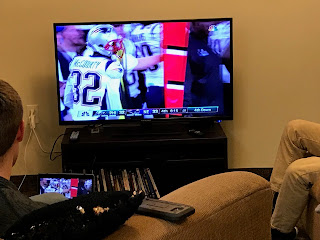Being the "Other"
This was interesting for me because it made me stop and thing about what situations I really am an "other" and I came to the conclusion that in a lot of social situations I am the other because of my sexuality. I think that because I can be really straight-passing, I don't really think about it but there are definitely situations where my sexuality puts me at odds with others when I am in groups with mostly straight people. So to really make it stand out, I decided that a Super Bowl party is the place where I will be the most other. It seems that football is the epitome of stereotypical straight masculine culture and since I am neither straight nor do I subscribe to the notions of traditional masculinity, this was a situation where I was "the other." Also, I don't like football which is a dangerous thing to say at a Super Bowl party.
In the normal conversation of the party, several homophobic slurs and comments were thrown out just as part of the culture surrounding football. It was, honestly, really uncomfortable. I'm not someone who is necessarily pegged as gay instantly so the assumption was that those comments were ok and not offensive to anyone in the room. I think that poses the greatest problem for my future students. If we aren't aware of who is in the classroom, it can be easy to assume that the stereotypes or comments that are thrown out will not really hurt anyone. And the case is more often than not, it will hurt someone.
Really, I coped with this by kind of shutting down. I didn't really interact much once those things were thrown out and I tried to make myself invisible. I'm sure it had no effect on the others in the room but I was upset and withdrawn. This also has implications for future students. They aren't likely to speak up when they are targeted as the other. They may even join in. I suppose it is my responsibility as the authority in the classroom, and someone who has a higher degree of privilege than is afforded to children, to stand up for the "other."
I think it was interesting to see how I was perceived to have cultural capital in the situation when really it wasn't there. But that gave the the capital. Confused? Me too, in a way. I guess what I'm saying is that I don't actually have to be straight to have straight privilege. Because of how I'm perceived, I'm often spared from being the brunt of oppression in face-to-face situations though I still experience it in other ways. But cultural and social capital still help the people that are perceived to have it, whether or not it is actually there.
Also, I know I grew up in straight culture but I'm realizing more and more how bizarre it actually is. Also, how closely straight culture is tied to white culture and all the other dominate culture.
In the normal conversation of the party, several homophobic slurs and comments were thrown out just as part of the culture surrounding football. It was, honestly, really uncomfortable. I'm not someone who is necessarily pegged as gay instantly so the assumption was that those comments were ok and not offensive to anyone in the room. I think that poses the greatest problem for my future students. If we aren't aware of who is in the classroom, it can be easy to assume that the stereotypes or comments that are thrown out will not really hurt anyone. And the case is more often than not, it will hurt someone.
Really, I coped with this by kind of shutting down. I didn't really interact much once those things were thrown out and I tried to make myself invisible. I'm sure it had no effect on the others in the room but I was upset and withdrawn. This also has implications for future students. They aren't likely to speak up when they are targeted as the other. They may even join in. I suppose it is my responsibility as the authority in the classroom, and someone who has a higher degree of privilege than is afforded to children, to stand up for the "other."
I think it was interesting to see how I was perceived to have cultural capital in the situation when really it wasn't there. But that gave the the capital. Confused? Me too, in a way. I guess what I'm saying is that I don't actually have to be straight to have straight privilege. Because of how I'm perceived, I'm often spared from being the brunt of oppression in face-to-face situations though I still experience it in other ways. But cultural and social capital still help the people that are perceived to have it, whether or not it is actually there.
Also, I know I grew up in straight culture but I'm realizing more and more how bizarre it actually is. Also, how closely straight culture is tied to white culture and all the other dominate culture.
I think this picture is illegal because the NFL is really protective so everyone be cool. But football uniforms really play into "masculine" ideals--there are other sports that have just the same amount of contact yet only football has padding to emphasize the shoulders and groin while minimizing the waist and hips. It is like the ideal man but turned up to 11.
The guys brought chips and salsa. Some of the guys brought the crockpot. But the girls ended up cleaning up the whole kitchen while the guys stood around (in the kitchen) talking. The tie to traditional stereotypes was too much for me to think this was coincidental.




Comments
Post a Comment